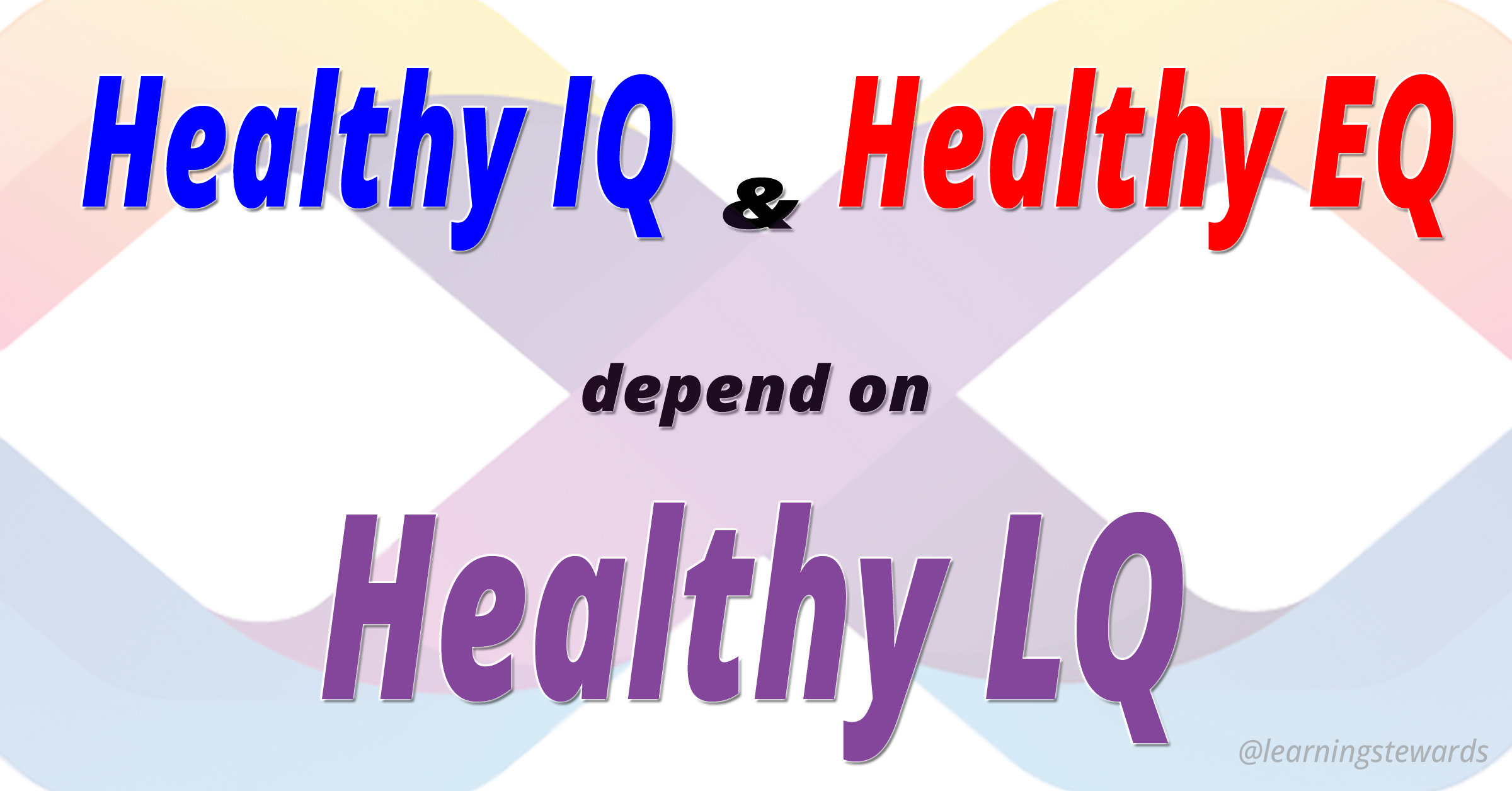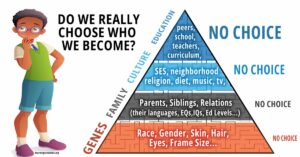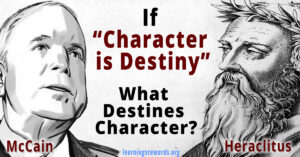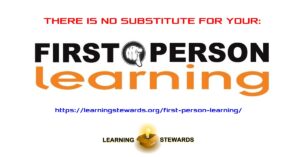
Biologically adapted to be adaptive, we are neurologically plastic – we are, constitutionally, learning oriented beings.
Can you remember yourself as a child? Try to remember yourself as far back as you can. What’s the difference between the ‘you’ you just remembered and the ‘you’ doing the remembering? Have ‘you’ changed at all? How did you become who you are today?
Scientifically, we know that DNA controls aspects of how humans progress from infants to adults. Intuitively, many believe that we have souls or soul-like essences that also influence how we grow up. But everything else about who we become, everything not ordained by biological programming and/or divine agency, we become through learning. Children adapt to the life-environments they grow up in (nutritionally, physically, emotionally, linguistically, socially, cognitively, academically). Children learn to become adults. The ‘you’ you were as a child learned to be the ‘you’ you are now. In profoundly underappreciated ways, for each and all of us, “I” am learned – “I” learned to be “me”.
- The body of an aboriginal child living in a jungle is adapting to his or her environment in ways that promote very different physical qualities than a child living in a city apartment. Eating and drinking naturally, the organs of such a child are different than the organs of an urban kid that have adapted to a diet of junk food and sugar water. We learn “life-styles” within which our bodies adapt (learn) (physically; healthily and unhealthily) to become how they become.
- Though genes determine much of our neural infrastructure, our brains are plastically–adaptive. Our brains evolved to extend beyond biological programming and wire themselves up in adaptive response to the environment they’re living and interacting in. The human brain has approximately 100 billion neurons but it is the trillions of connections between them that make us who we are. Some of those connections are DNA coded – the superstructures – but the vast majority of the connections form in response to our environmental interactions. Thus, in terms of what most makes one human brain different from another, our brains are learned.
- Though our capacity for speech is innate, we learn our way into our facility with language. Babies’ brains come ready to learn to process the kinds of auditory discriminations necessary to understand all human languages. They come ready to learn to control all the anatomy involved in producing the speech sounds of all human languages. But early on, normally developing baby brains learn to specialize in the languages they are being bathed in. Babies are born with the innate abilities needed for listening and talking and use those abilities to learn their way into listening and talking according to the language environment and conversations they grow up in. The richer the language environment and conversations the richer their facility with language.

- Aspects of our intelligences are innate, but the intelligences implicit in our physical, emotional, verbal, literate, intellectual, social, economic, political, and other behaviors are learned. Learning (v) is the exercise of intelligence. Learning(n) is the memory-effects of the exercise of intelligence (like muscle-effects result from physical exercise). To whatever degree our intelligences aren’t genetically determined, our intelligences develop – grow – extend – adapt – evolve – improve or whatever other word you might prefer – through learning. It is through learning that your intelligence, whatever that means to you, is different now than it was when you were born. The physical, emotional, verbal, literate, intellectual, social, economic, political… and other environments we grow up in and adapt to exercise our intelligence differently to the degrees that they challenge and support our learning differently.
- Though we are born with innate affects that determine much of our emotional experience, our emotional intelligence is learned. We are all capable of experiencing positive emotions like interest and joy and negative emotions like fear, anger, and shame. But we learn to manage our emotions quite differently. Children can learn to be tyrannical with their anger, experience sublime delight in music or become compulsive liars to avoid shame. We may be born with character traits but we learn our character. We learn our deep seated patterns of emotional behavior in the context of the relationships we grow up in. Self-disesteem is learned.
For each and all of us, learning affects everything.
“I” am the “me” I learned to be.
You are the “you” you learned to be.
We the people are the people we’ve learned to be.
The only thing I can say for sure about me, is that I am who I learned to be. How about you? Who are you other than who you learned to be?

See also: Choosing to Learn – Learning to Choose “More than choosing who we become, in a great many ways, we can’t help but learn to become who we become within our inherited and environmental conditions, situations, and possibilities. This is not to say we don’t have any choice, just that the choices we do have, we have because we learned to have them within situations and conditions we didn’t choose.”
 See also: Learning: Character “If you could strip away everything you’ve learned, would there be any “you” left? How do you know? How could you know?”
See also: Learning: Character “If you could strip away everything you’ve learned, would there be any “you” left? How do you know? How could you know?”
From “IS INEQUALITY A MATTER OF CHOICE“: Try this thought experiment: think of a friend of yours who is far less advantaged in life. Imagine you were born into his or her body and lived their life since birth. Would you be any different than they are now? How do you know? On what basis could you possibly assume that you would be different? This is a bit of a trick because it presupposes there is a you (some kind of essence or soul) that exists independently of who you’ve learned to be. I’m not saying there isn’t such a soul, rather that anything we can say about it is through the prism of our learning. Hopefully you get the point. The differences between your choices and your less fortunate friend’s are not necessarily choices you chose to have.
 See also: First-Person Learning Any meaningful reform of education must begin by re-defining, socially-broadly, the word learning. Learning isn’t just an ancillary mental utility, learning is the central dynamic of being human.
See also: First-Person Learning Any meaningful reform of education must begin by re-defining, socially-broadly, the word learning. Learning isn’t just an ancillary mental utility, learning is the central dynamic of being human.
changing how we think about learning changes everything.
This site is a continual work in process. Its pages are working drafts that will evolve over time. If our work interests you please share your thoughts, feedback, and comments and consider subscribing to receive updates about new posts and articles. If you think what we are doing is important, please consider contributing whatever you can to our non-profit work (see side panel). Together let’s ignite the dialogue.
IT’S TAX DEDUCTIBLE
Learning Stewards
4211 Graf Dr.
Louisville, KY 40220

I’m excited about this new venture. Your earlier meeting program Is most valuable and I prize it. Thanks for your good and continuing work.
I used to do a newsletter about the brain and learning for some 20 years. I found the book Human Brain and Human Learning by Leslie Hart (deceased) very useful for understanding how the brain works in a general sense.We still mostly ignore certain key factors about the brain in schooling.